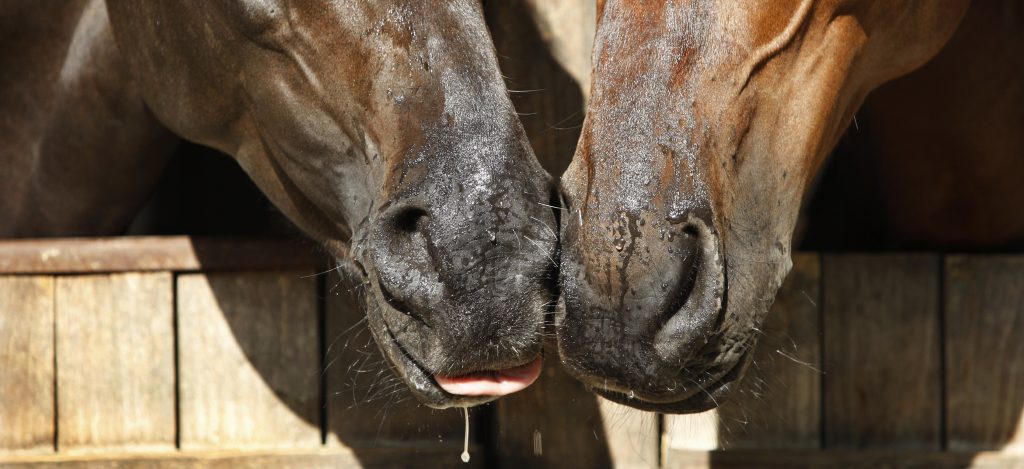September 28 is World Rabies Day

Did you know there is a Global Alliance for Rabies Control (GARC)? On September 28, 2023, GARC coordinates World Rabies Day and this year’s theme is: All for 1, One Health for All. This date also marks the anniversary of Louis Pasteur’s death, the French chemist and microbiologist, who developed the first Rabies vaccine. The Rabies booster remains part of the core vaccines horse owners mark on their annual immunization calendars for good reason. Core vaccines provide protection against diseases that have a significant health impact (including death) for the horse and/or to humans. To help tailor annual immunization plans, Equine Guelph provides a free, interactive, Vaccination Equi-Planner healthcare tool (TheHorsePortal.ca/VaccinationTool).
Kindly sponsored by Zoetis, the Vaccination Equi-Planner is designed to explain the risk factors and then provide a print-out personalized to your horse’s vaccination needs. This is a great way to get the conversation started with your vet.
While dogs are vaccinated against rabies without question, the majority of horses – who are often at higher risk – are not always vaccinated.
Horses are nearly four times more likely to contract rabies than dogs.1-3 Across North America, the majority of horses are not vaccinated for rabies and often have a higher risk of exposure than dogs.4
Rabies is the deadliest among the five core equine diseases, which also include Eastern equine encephalomyelitis (EEE), Western equine encephalomyelitis (WEE), tetanus and West Nile. Horses are continually exposed to wildlife and mosquitoes that transmit core equine diseases. Whether kept in a barn or pasture, horse owners should not consider their horse spared from dangerous disease risks. As such, core disease vaccinations are recommended annually as part of overall equine wellness, according to the American Association of Equine Practitioners core vaccination guidelines.
“Any of the core diseases can be a death sentence for an exposed horse – and alarmingly, with exposure to an animal infected with rabies – family members, friends and any other persons exposed are also at risk of losing their lives to rabies disease, which is always fatal,” said Kevin Hankins, DVM, MBA, senior technical services veterinarian with Zoetis. “A horse owner’s best defense against these devastating diseases is through annual core disease vaccination.”
In Canada, the most common wild animals to transmit Rabies to domestic animals or humans are foxes, skunks, racoons and bats. The virus is found in saliva and transmitted to other animals and people typically by a bite. Rabies is among the core recommended vaccines due to the deadliness of this disease affecting the nervous system.
Rabies is easily prevented by vaccination. Following an initial booster series, Rabies vaccines are administered to horses annually and they must be administered by a licensed veterinarian.
Fortunately, Rabies is not often diagnosed in Canadian horses, however its importance cannot be understated. To find out the number of confirmed Rabies cases in Canada in 2023, go to the Canadian Food Inspection Agency.
Further Reduce Your Risk of Sickness and Disease

After checking the free Vaccination Equi-Planner healthcare tool (TheHorsePortal.ca/VaccinationTool), take a deeper dive into preventing sickness in your horse with Equine Guelph’s short course, also kindly sponsored by Zoetis, Sickness Prevention in Horses.
Based on the Canadian standard for equine biosecurity, the Sickness Prevention in Horses short online course breaks down important information into easy, practical tips you can use right away.
Maintaining health is everyone’s responsibility and for only $95 tuition, this important short online course could save you well over triple the cost in veterinary bills. Register today for Sickness Prevention in Horses offered Mar 18 – 29, 2024!
References:
1 Ma X, Monroe BP, Cleaton JM, et al. Rabies Surveillance in the United States during 2016. JAVMA. 2018;252(8):945-957.
2 The American Society for the Prevention of Cruelty to Animals. Pet Statistics.
https://www.aspca.org/animal-homelessness/shelter-intake-and-surrender/pet-statistics. Accessed May 17, 2018.
3 American Horse Council; Washington, DC; 2017 Economic Impact of the U.S. Horse Industry.
4 Equine Management and Select Equine Health Conditions in the United States, 2015. United States Department of Agriculture.
https://www.aphis.usda.gov/animal_health/nahms/equine/downloads/equine15/Eq2015_Rept3.pdf. Accessed May 17, 2018.

